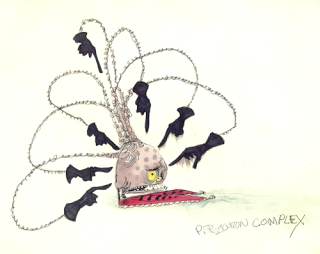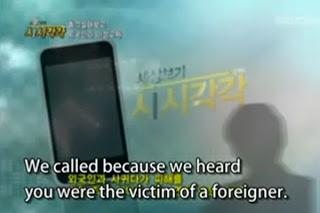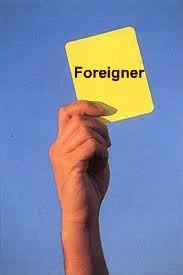 It has struck me that, for quite a long time, I have noticed a sort of heightened sensitivity in the foreign community living in Korea to any form of discrimination they might receive while living there.
It has struck me that, for quite a long time, I have noticed a sort of heightened sensitivity in the foreign community living in Korea to any form of discrimination they might receive while living there.Let's first note that there is quite a lot of racism in Korea, there is a fair amount of prejudice against non-Koreans. This is usually in the form of general ignorance, however, rather than malice. There are, of course, exceptions to this rule just like there is in almost every country in the world.
There is also a general, almost institutionalised racism present in Korea that is slightly different to what I have noticed in many Western countries. In the West, the media, the government and most well-educated people realize that racism is wrong and do not promote it. General, sober, conversation between people often also has a guarded feel when the subject has a racial element to it. Any form of prejudice expressed can be jumped upon by the liberal crowd and quite rightly so. I do think, however, that there is an undercurrent of disquiet and discrimination that is still present pretty much everywhere. As with most people, if you want to know how they really think, throw a few beers into them - this seems to do the trick quite nicely in the UK with regard to exposing the racists.
In Korea, things are different. Sometimes it does feel like some forms of discrimination are enshrined in law and general everyday routine and awareness has to be raised about it. It is easy to understand how laws on HIV and drug testing and mainstream television programs singling out 'foreigners' as specific generators of violence, sexual crime, and immorality make people upset, for example. This is not just some moron on the street shouting racial abuse because he is drunk or just plain stupid, it feels like voicing your disgust could actually do some good and is needed to break a kind of spell of prejudice over some of the population in Korea.

Because of all of this perhaps, there do seem to be signs of a persecution complex forming in the Western community that live in Korea and in those that have left and tell their stories when they get back home. Many Korean people do discriminate against us sometimes and what is important to recognize is that this can be both good and bad for us. Strangely, I have always found it is the times when Koreans do not discriminate at all which regularly upsets me the most and I think many Westerners living in Korea fail to notice this when they are genuinely advantaged by discrimination and when they are disadvantaged by just being treated like everyone else. Many simply want to have their cake and eat it and this might not be possible, perhaps we have to take the rough with the smooth.
Maybe if you are generous and patient enough to look through some of the negative articles about Korea I have posted on this blog, it might not escape your notice that they are mainly concerning the effect some of the negative aspects of the culture have on Koreans themselves. Women and young people, in particular, appear to be severely hampered by their duties to older people and petty jealousies and worries over status - so important in a culture with a traditionally Confucian society - make so many people's lives a misery here.
A couple of weeks ago, I posted an article about the shabby treatment of native English teachers. In this post, I readily admitted that Korean and South East Asians have a much harder time at work than Westerners. Native English teachers have pretty sweet contracts and are mostly protected from any monkey business from their employers, especially if they work in a public school. I accept that there are many horror stories, however, (which I mentioned in the post) but I have heard far worse from the mouths of Koreans themselves and what is so troubling is that they often just seem to accept it as normal practice in the workplace. The major problem for most foreign teachers is the lack of discrimination they receive at work, though, and not vice-versa.
The point I was trying to make is that schools in Korea cannot get around their responsibility to their foreign teachers. Native English teachers are usually young, have traveled from a culture that is completely different, and normally don't speak Korean too well. They need help. The fact is, though, that many schools in Korea do this very begrudgingly in my experience, Trying to have them do something for you, even minor requirements, is a bit like pulling teeth. This is not down to discrimination, however, it is because they are treating you as a normal member of the group at work. Actually, we tend to get better treatment than any normal young new employee. Korean people new to a job often have the hardest time of all; they usually do the most work, run around for their superiors, and may even be bullied. Most of the time Westerners are discriminated against, in that they aren't made to perform all the duties of a new employee. Native English teachers should really be thankful for the discrimination they receive in their schools.
 There are a great many situations where we Westerners search up our sleeves and play the 'Foreigner card' roughly translated to a 'get out of jail free card.' This has saved my bacon or avoided a myriad of awkward situations time and time again. If I was a young Korean man or especially a young woman, I would have had an almost limitless number of mind-blowing situations to sit through in the last 3 years or so. My good fortune to be a foreigner who is discriminated against is not lost on me. This does not mean that I avoid all difficult circumstances in Korea, but I do slink away from a good fair few. Koreans themselves are not so lucky and this is what I mainly get rather upset about, particularly as this often includes my wife. As well as my natural empathy for her as a husband, I also get a bit of an earache and headache at home when I have to hear about what members of her family or work colleagues have said to her or the trouble they have put her through, all because she is a woman and/or younger than them.
There are a great many situations where we Westerners search up our sleeves and play the 'Foreigner card' roughly translated to a 'get out of jail free card.' This has saved my bacon or avoided a myriad of awkward situations time and time again. If I was a young Korean man or especially a young woman, I would have had an almost limitless number of mind-blowing situations to sit through in the last 3 years or so. My good fortune to be a foreigner who is discriminated against is not lost on me. This does not mean that I avoid all difficult circumstances in Korea, but I do slink away from a good fair few. Koreans themselves are not so lucky and this is what I mainly get rather upset about, particularly as this often includes my wife. As well as my natural empathy for her as a husband, I also get a bit of an earache and headache at home when I have to hear about what members of her family or work colleagues have said to her or the trouble they have put her through, all because she is a woman and/or younger than them.The unfortunate thing about Korea - which is shared all over the world, but with perhaps a more of an ingrained intensity in Korea - is that high status rules. If you are old and a man, you can expect to be treated well; if you are young, a woman, or an outsider, you will not be considered so much or treated with very much care and attention and perhaps not trusted so much either. The handy thing about being an outsider is that many older Koreans don't understand us and we can also plead ignorance. The one thing against us non-Koreans is that we receive even less trust than low-status Koreans because of the fact they can't comprehend us. People will always fear and distrust things that they don't understand. Historical isolation, invasion, and colonisation have further fueled a natural distrust of the outsider in Korea. This is obviously the source of the xenophobic, insecure, and defensive atmosphere that one can experience in Korea sometimes and maybe why many foreigners feel persecuted.
There is this sense, though, that some feelings of persecution are going too far. Often, some foreigners get so down on Korea that it seems as though everything Korean people do and say to them is an example of prejudice, suspicion, or even hatred. I do not believe this is at all the case, most of the time we are not receiving special unwanted treatment. I have a grumble every morning when I cycle to work when I notice about 10 examples of dangerous or at least inconsiderate driving in 10 mintutes, but this is not directed at me because of my big nose and blonde hair, many Korean drivers are just indiscriminately terrible with regard to others while driving, whether it be pedestrians, cyclists or other motorists. My non-Koreanness has absolutely nothing to do with it and I suspect this is the same for many other situations that rub a lot of us up the wrong way while living in Korea.
Korea is topsy-turvy land, I do believe it can be a very odd place to live and I think the evidence from many foreigner's complaints is that it can certainly be infuriating, especially to Western eyes. There are many things I personally don't like accepting, I want to change them or at least try, yet at the same time acknowledge that I cannot do that much (I do not think it hurts to try, though, one should not be defeatist about everything). I don't believe that any of it is down to a special malice or nastiness within Korean people, however, they are generally as nice and kind as anywhere else I have lived or visited and there are many joys and lessons to be learnt from them and living in Korea in general. They can sometimes make me annoyed, even outraged, due to some of their attitudes that are mainly caused by a cultural difference, but I have to say that persecuted is not a sensation that I feel while living here.
There are examples of persecution sometimes for sure, but let's not go over-board, not every problem that afflicts us in Korea is down to discrimination, far from it. In my experience at least, my biggest issue is when they treat me like just another Korean. I want to be understood as an individual, not as part of the group, I require some special attention and special understanding because I am not like them and I am not like anyone else either. Indeed Koreans are not all alike, they differ from one another and one of my major complaints with the culture in this part of the world is that too often people aren't treated as individuals. The group ethic has some huge drawbacks because of this and I believe the foreign community identifies and feels this with a greater degree of sensitivity. It could be that this is the root of many of our problems with Korea and not persecution or discrimination. We want to be recognised as individuals but instead get lumped into groups, sometimes with the Koreans at work and sometimes the best of us are thrown in with the bad and the ugly, like when the inevitable odd foreigner turns out to be a criminal and all of us are tarnished by them.
A natural tribalism exists everywhere; grouping people into, 'us and them', is something that almost everyone does to some extent, it is an incredibly hard urge to resist. Treating people as individuals without prejudice is the way forward and maybe a group-centred culture makes this more difficult. Being outraged about poor treatment certainly has a place, but foreigners in Korea should stand-up for everyone receiving it in Korea, not just themselves. It is not, 'us against them', we are all in this together.
